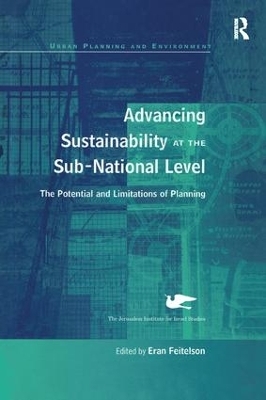
Advancing Sustainability at the Sub-National Level
Routledge (Verlag)
978-1-138-24790-1 (ISBN)
Eran Feitelson is an Associate Professor and Chair of the Department of Geography at The Hebrew University of Jerusalem, Israel.
Contents: The potential and limitations of planning in advancing sustainability notions at the sub-national level: an introduction, Eran Feitelson; Very long-term planning for the era of climate change, Eliahu Romanoff and Thomas Gloria; Can Israel plan for sustainable development? An institutional analysis and constructive critique, Ernst R. Alexander; Decentralized planning for sustainable urban development: the Washington State Growth Management Act and its application in the Seattle metropolitan area, Donald Miller; Integrated planning for air quality - a human concept and a computer programme, Dalia Lichfield; The role of strategic planning in advancing sustainability at the metropolitan level: the case of Tel Aviv, Eran Feitelson; The integration of environmental, social and economic issues in spatial planning: case study of the metropolitan spatial development framework for Cape Town, South Africa, Desiree Shepherd and Keith Wiseman; Policy recommendations and implementation of Local Agenda 21: the example of Lodz (Poland), Tadeusz Marszal; Implementing sustainable business estates in the Netherlands: a confrontation between theory and practice, Erik Louw; An 'Actor-Consulting' model for sustainable planning: an application in sustainable housing development, Frans Osté and Gert de Roo; Public-private partnership as new integrated instruments for achieving sustainable urban development: the case of Monza, Luisa Pedrazzini; The role of local knowledge in environmental health planning, Jason Corburn; The potential of framing in managing and resolving environmental conflict, Deborah Shmueli and Michal Ben-Gal; Participatory decision making and sustainability: the role of environmental organizations, Karel Martens; Index.
| Erscheinungsdatum | 04.07.2017 |
|---|---|
| Reihe/Serie | Urban Planning and Environment |
| Verlagsort | London |
| Sprache | englisch |
| Maße | 156 x 234 mm |
| Gewicht | 453 g |
| Themenwelt | Naturwissenschaften ► Biologie ► Ökologie / Naturschutz |
| Naturwissenschaften ► Geowissenschaften ► Geografie / Kartografie | |
| Sozialwissenschaften ► Politik / Verwaltung ► Staat / Verwaltung | |
| Technik ► Umwelttechnik / Biotechnologie | |
| Wirtschaft ► Volkswirtschaftslehre ► Ökonometrie | |
| ISBN-10 | 1-138-24790-1 / 1138247901 |
| ISBN-13 | 978-1-138-24790-1 / 9781138247901 |
| Zustand | Neuware |
| Haben Sie eine Frage zum Produkt? |
aus dem Bereich


